Making Our Government Serve the People
Friends,
My newsletter is going to take a bit of a different form this week, because I think it’s important to lay out exactly what is going on. I’ve gotten a lot of questions this month, and I’ll try to answer some of them to my best ability.
What On Earth Is Going On In DC?
The government has now been shut down for 32 days, the longest government shutdown in our nation’s history. If you’re like me, you find all of this completely unacceptable.
This shutdown is a direct threat to our region’s families and economy in an area where the federal government is our largest employer.
In the last few weeks, I’ve heard from some of the thousands of folks throughout our area affected by the shutdown. I’ve heard from a federal prison guard who said she just fought off cancer last year and is now having to choose between the prescriptions that keep her healthy or child care for her kids. I’ve heard from TSA agents who are showing up without pay because they believe in the mission of keeping our country safe, even if the country isn’t paying them. I’ve heard from members of the Coast Guard who are protecting the security of our country without having economic security for their own families. I’ve heard from the folks involved with the non-profit that runs the ski slope on Hurricane Ridge. They told me that they’ve already lost 40 percent of their season - funds they won’t recoup - and every day this shutdown continues puts them in further jeopardy.
This is just plain wrong.
Sadly, this shutdown has meant 800,000 people are not getting paid - despite the fact that many of them have been going to work every day. Many of these folks are already living paycheck-to-paycheck and like most Americans, they are worried about making ends meet. Local families have had to line up at food pantries. Many of those families are Coast Guard families, because for the first time in our nation’s history, the government isn’t paying members of our armed forces because of a lapse in Appropriations.
This is a national disgrace. We’re a better nation than one that asks people to put their lives on the line at work then get in line at a food bank for dinner.
So, What’s Being Done To End This?
Since the government shut down, I’ve voted in support of reopening the government nine times in three weeks. Each of those nine times, the House passed bipartisan legislation to reopen the government - bills that actually passed the Senate with the support of Republicans just a few weeks ago.
Yet the Senate now refuses to take these bills up, and the president has said he would not sign them because they do not fund the border wall.
There’s a legitimate discussion to be had regarding border security - but that discussion is best held with the government open - not closed. Folks in DC cannot and should not just shut the government down when they have a disagreement on a policy issue. Having previously worked in business and economic development, I can tell you that you’d never see a successful business - when having a management disagreement - simply shut down the business for weeks on end. They’d keep the lights on, pay their employees, and act like adults. That’s what folks in DC should do!
But Shouldn’t Something Be Done About Border Security?
I’ve gotten a good chunk of questions regarding issues related to border security. With that in mind, let me take a deeper dive into the policy considerations here.
Let’s start with a little history on what the federal government has already been doing on this front.
In recent years, Congress has made substantial increases in investments in border security and enforcement. For example, over the last decade, we’ve seen a 93% increase in funding for Border Patrol operations, with most of the additions being targeted toward the southern border. In addition, there has been substantial investments in fencing and technology to detect illegal activity.
I’ve been supportive of strengthening border security. But doing so should be grounded in what actually works - not on spending billions of dollars to fulfill a campaign promise (particularly one that Mexico was going to pay for).
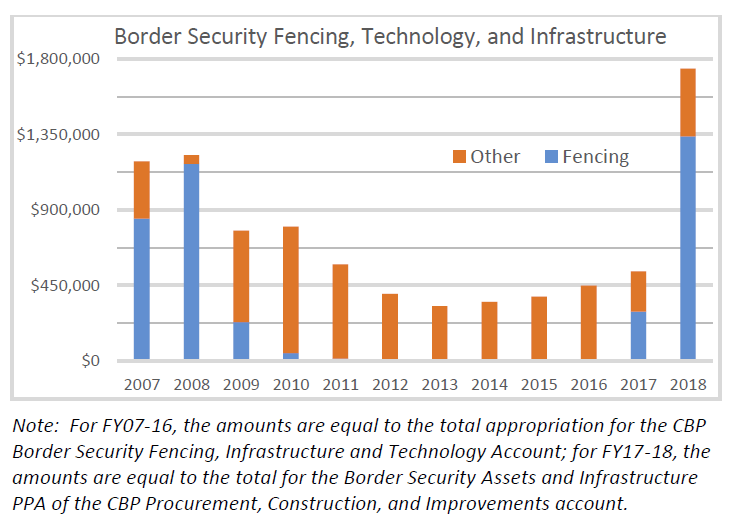
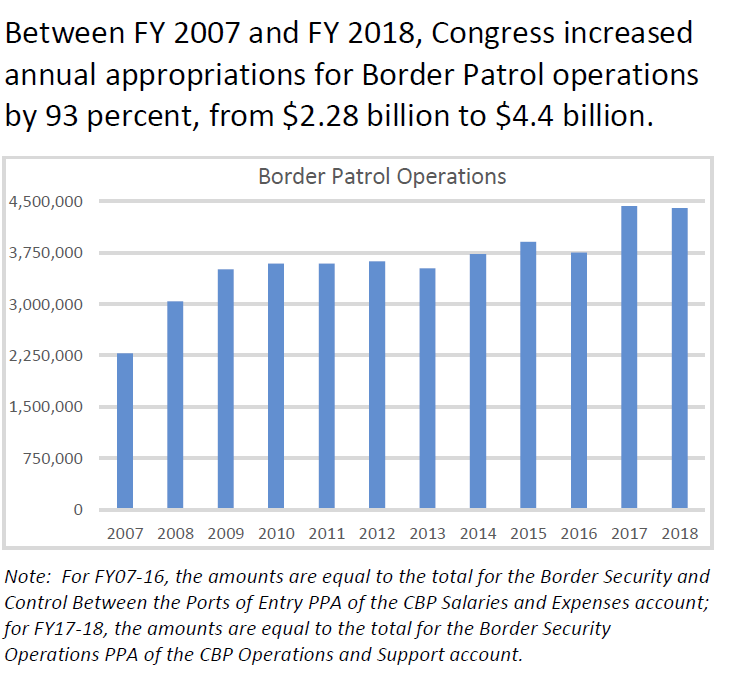
In the president’s speech to the nation last week, he said that he needed the wall to keep drugs and terrorists out of our country. That’s a good goal! But the facts lead to a different conclusion. About 90 percent of the hard drug seizures - including seizures of cocaine, heroin, meth, and other drugs - have occurred at our nation’s ports of entry - not at the southern border. In contrast, in 2018 less than 3 percent of all the heroin seized in this country was seized at the border.
There is a real concern about known or suspected terrorists trying to come into our country. But the vast majority of those on the terrorist watch list who have been caught or turned away were not caught at our southern border. Rather, they were stopped coming in by air, flying into our nation’s airports, or when they applied for visas. And among those who attempted to cross by land, six times as many tried to enter through the Canadian border.
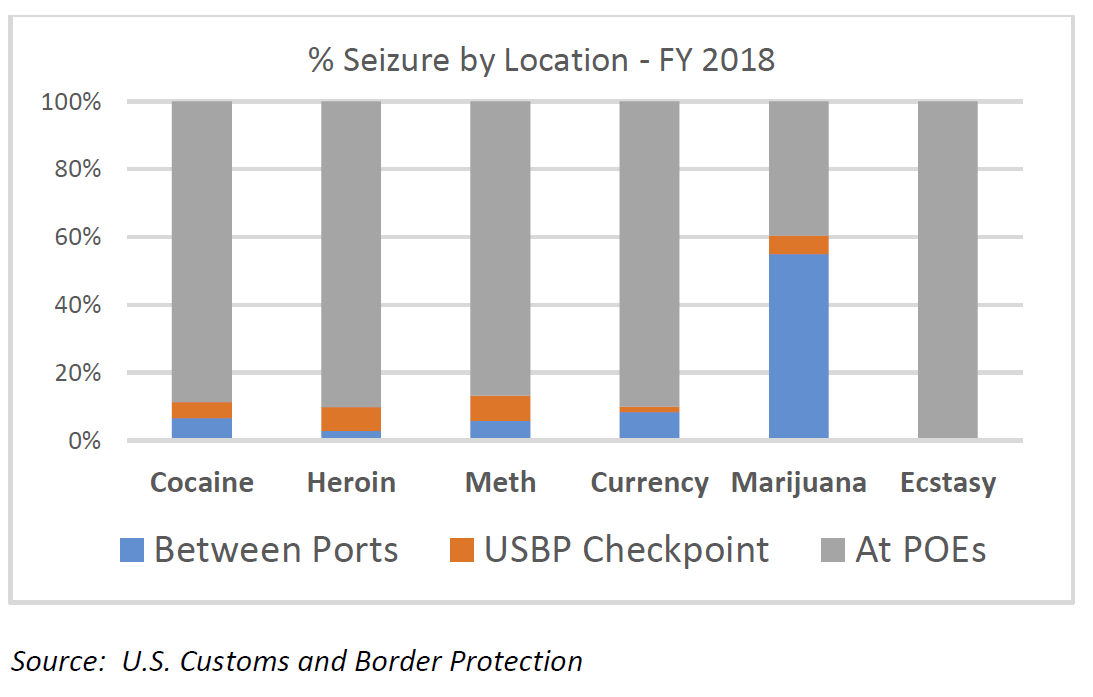
What’s more, despite the increase in air time from the president, apprehensions at the southwest border, which are considered a proxy for attempts to illegally cross the border are down substantially.
They’ve declined from 1.6 million apprehensions back in 2000 to 396,579 this past year.
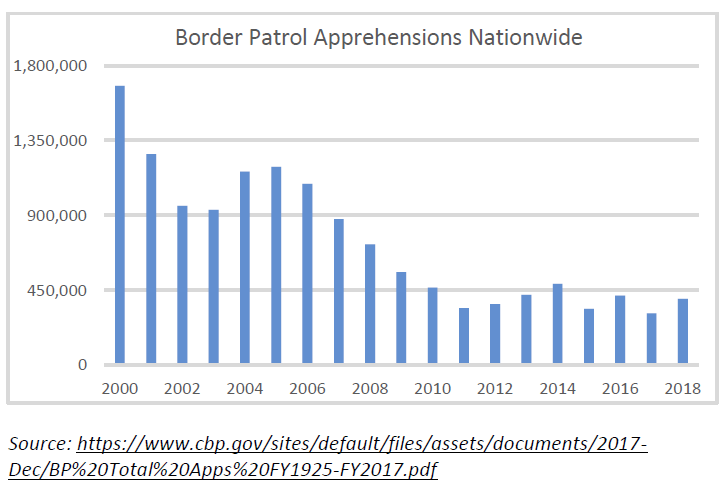
About The Wall? And If Not The Wall, Then What?
The phrase “build the wall” makes for a good bumper sticker, but the reality is that border security is complex and challenging.
I’m for border security - and have actually sponsored bipartisan bills to secure the border and address some of the root causes leading to migration at our southern border. But, in light of the statistics I mentioned above, I view a $25+ billion wall from sea-to-shining-sea as a 5th century solution to a 21st century challenge. Homeland security experts tell us that there are smarter investments to be made. For example, Congress should invest in surveillance and monitoring technologies (like censors and drones) at the border. Congress should make investments that modernize our ports of entry and enable more comprehensive and thorough vehicle screening. Congress should fund additional border agents, particularly at ports of entry. And Congress should make investments that get at some of the root causes - the instability and chaos we have seen in Central America - that have led to a spike in people coming to our southern border.
We also need to hire more customs officers. Currently, there are more than 3,000 vacancies that should be filled. These are the folks who facilitate trade and travel at our land, air, and sea ports of entry, inspect commercial and passenger vehicles, and make sure that travelers are vetted and screened before entering the United States.
My Republican colleague, Will Hurd, who spent a career in the CIA before coming to Congress and represents a Texas district that includes 820 miles of the US border, said this week: “What I always say is building a wall from sea to shining sea is the most expensive and least effective way to do border security.”
Rep. Hurd is a lead sponsor on a bipartisan bill I’ve cosponsored called the USA Act. In addition to addressing the challenges facing DACA recipients (also known as DREAMERs), the bill improves border security by using cutting-edge technologies and other investments to reduce illegal immigration. Specifically, the bill directs the Department of Homeland Security to develop a strategy for every section of the Southern border, requiring it to do a mile-by-mile assessment to determine the most effective and practical way to secure it. That may involve technology, or if there’s clear justification for more expensive options like physical structures - including walls or fencing - Homeland Security can recommend that as well.
I think this represents a reasonable compromise. This type of assessment to determine the best ways to protect our border seems like a more sensible approach than keeping the government shut down unless and until Congress funds a wall.
What Can Be Done For Those Impacted By The Shutdown?
Obviously, priority one is ending this ridiculous shutdown. In the meantime, I’m doing all I can to help our neighbors who are directly affected it.
Senator Brian Schatz (D-HI) and I co-wrote legislation that would protect federal workers from eviction, foreclosure and other hardships of working without pay.
I have also co-sponsored three different pieces of legislation that would protect those serving in the Coast Guard from the government shutdown - the Pay Our Coast Guard Act, the Pay Our Coast Guard Parity Act, and H.R. 421, which would fund the Coast Guard while the government is shutdown.
Washington, DC must get its act together for the more than 45,000 folks nationwide serving in the Coast Guard, who are among the 800,000 federal employees not being paid.
With Congress Being Called Back To DC, What’s Up With Your Town Halls?
You may have seen that I had scheduled some town halls next week but, because of the government shutdown, I am being called back to Washington, DC. As a consequence, I’m going to have to reschedule many of them for early February. Having said that, I will be holding a FacebookLive town hall from my DC office this Wednesday at 6:00pm PST. You can participate in this online townhall here.
Barring further changes to the vote schedule, I’m still planning on being able to make the following town halls this upcoming weekend:
KITSAP COUNTY TOWN HALL
Date: Saturday, January 26, 2019
Time: 10:00AM
LOC: North Kitsap High School Community Auditorium, 1881 NE Hostmark St, Poulsbo, WA 98370
MASON COUNTY TOWN HALL
Date: Saturday, January 26, 2019
Time: 3:00 PM
LOC: North Mason High School, 150 E North Mason School Rd, Belfair, WA 98528
Doors open 30 min prior to the event’s start time.
Working for You
As always, you’re the boss. My favorite part of this job is meeting with all of you! Here are some of the highlights from the past couple weeks:
Honoring Rev. Dr. Martin Luther King Jr.
Over the last couple of days, I was able to honor the life and legacy of the Rev. Dr. Martin Luther King Junior at multiple events throughout our community. I am inspired by his legacy of activism and leadership in a divided time.
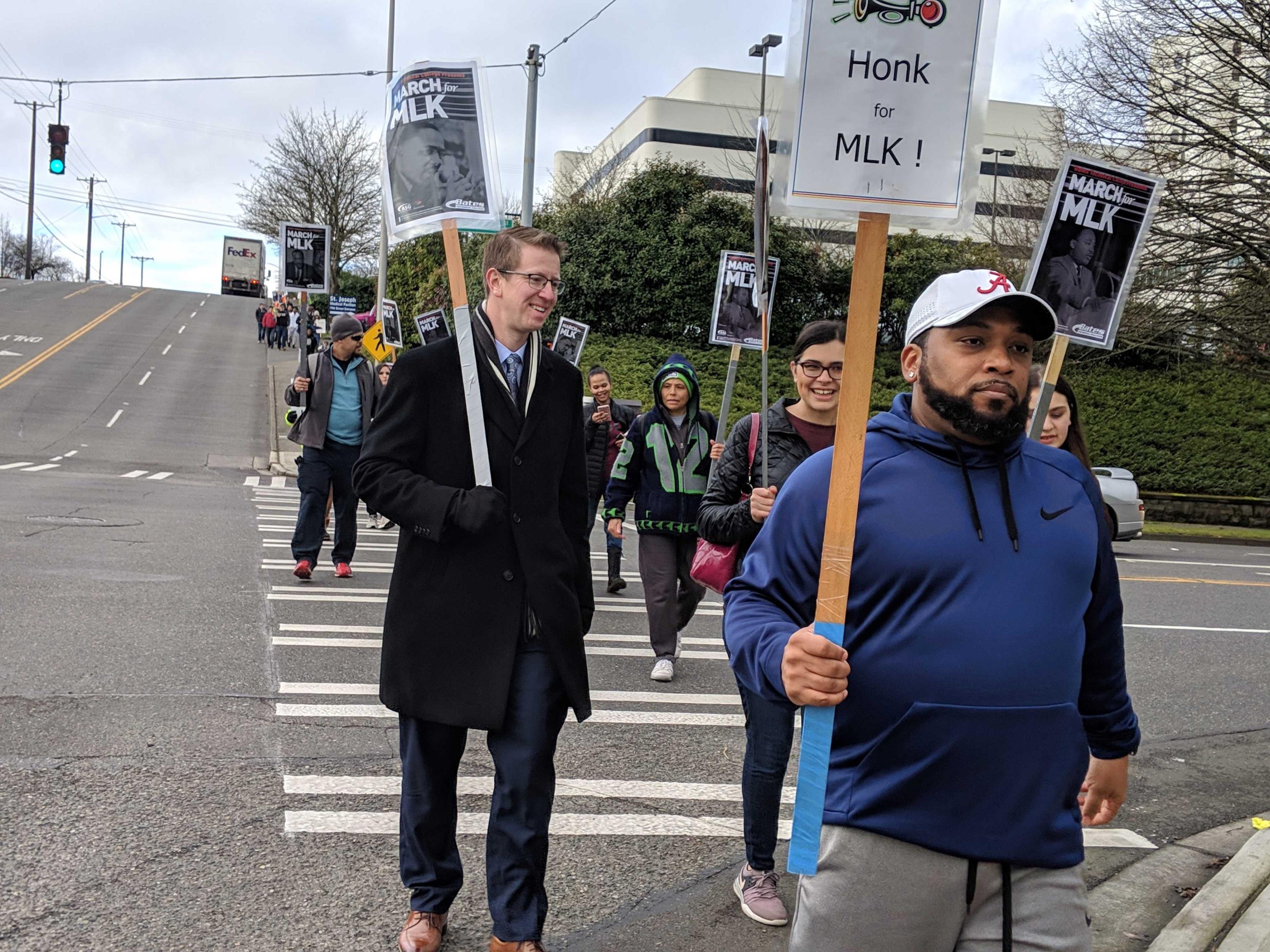
Keep the faith. A special thank you to those of you who are doing without right now, those who are serving our nation and community without knowing when your next paycheck is coming. I appreciate you, and I'm working as hard as I can to end the shutdown and get the government back open. You deserve a government that works better than this, and one that works for you.
Derek
